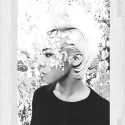“Chatty abstraction” is how Eileen Myles described the defining quality of New York School poetry in an essay in the Fall 2003 issue of Mississippi Review. “John Ashbery heard John Cage’s randomness of composition and was a fan of abstract expressionist painting and John Ashbery decided that we could do that in literature, too,” Myles writes. “Abstraction. Let the sentences stop and start like one’s attention. In Frank O’Hara’s poetry the abstraction took a vivid human form.”
Jennifer Maiden’s “Diary Poem: Uses of Frank O’Hara” moves seamlessly in and out of a number of conversations, which give the poem an architecture through which Maiden’s flow of speculation (on the nature of poets and poetry, the stubborn anxieties of influence, aging and more) can run. There are brief chats between the speaker and her contemporaries, Johns Frobes and Tranter, dialogue with a reviewer, her daughter, and, as the diary form encourages, with herself. These ”real” or “historical” conversations lead into, and set the stage for, the longer, imagined exchange with Frank O’Hara “on a gritty tenement balcony / on a star-chilled American evening / with drinks in our numb hands speculating / why poetry is so much about denying / what one is not.” It is this “chatty abstraction” which allows the poem to be so open to conjecture and so free to espouse.
Jennifer Maiden has published 28 collections of poetry and has won many awards including the Victorian Prize for Literature, the Age Poetry Book of the Year (twice), the overall Age Book of the Year, the Kenneth Slessor Award (three times), and the Christopher Brennan Award for lifetime achievement in poetry. She has been described by Gig Ryan as “one of the most striking voices to emerge from a generation that included John Forbes, Martin Johnston, Robert Adamson and Michael Dransfield.”
Diary Poem: Uses of Frank O’Hara
Years ago when John Forbes praised
my later work, he said my Problem
of Evilwas influenced by Tranter’s
Red Movie, and being younger and furiouser,
I rang Forbes and explained P. of E.
was actually written first. The paper
printed an apology but wicked Forbes
started at once to speculate that Tranter
had based Red Movie on P. of E., a claim
of which I thought I’d better warn Tranter,
who laughed:
‘Anxieties of Influence’, and that phrase
came back to me recently when a reviewer
said I’d learned a lot from Frank O’Hara.
I explained to my daughter I’d never
read O’Hara and she, the Fire Tiger,
defended me on those grounds, so the reviewer
professed shock that I had never read O’Hara.
I wondered: am I shocked myself
really that I’ve never read O’Hara? I do
not miss O’Hara, but I said I would
write a poem called Frank and Iabout us.
The imaginary O’Hara would confess
of course that he has not read me either,
despite which we would feel quite at home.
I see us relaxed on a gritty tenement balcony
on a star-chilled American evening
with drinks in our numb hands speculating
why poetry is so much about denying
what one is not, and why anxiety
about influence is stubbornly so scary.
‘I’ve heard you use long lines’, I
would say, and explain, ‘The longer
lines in my last book were two typos I
just missed and not an urge to run
some novel verbal marathon.’ He might
reply, ‘My long lines were a try
at showing poetry is still not prose, however
long the line and to avoid the slashes
which Olsen thought pauses for breath.’
I nod, ‘I’ve used slashes, too, but not
for that, just to intensify
and quicken the pace.’ We would
be getting on quite well by then. ‘Someday,’
I’d say, ‘I would like to read you, but
of course now there is my current worry
that influence might be retrospective,
and that I’ll recognise your hand
in everything I’ve written, anyway.’ He’d say,
‘I don’t think it’s likely – aren’t
you more into the lyrical? You look
sort of more lyrical but that
might be the light.’ I would wonder: have I
aged back to O’Hara’s age? He died
before he turned forty and maybe
one ages to the time and company.
Or maybe there are such lost creatures
as poets and each meeting each at first
in any place is nervous and newborn,
under erudite, angry cover. My daughter
thought the critic was doing the haka. I
might have done the haka with O’Hara
had I read him, but in the ever
new American night I would rather we
still sat there still, regaining self-
sense outside the great archives of torture.
First published in Australian Book Review
Go to Source
Author: Thomas Moody
